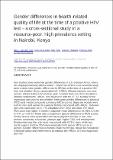Gender Differences in Health-related Quality of Life at the Time of a Positive HIV Test – a Cross-sectional Study in a Resource-poor, High Prevalence Setting in Nairobi, Kenya
View/
Publication Date
12/19/2017Type
Article, Journalviews
downloads
Metadata
Show full item recordCitation
Carmina R. Fumaz, Maider Larrañaga-Eguilegor, Sonia Mayordomo-López, Sandra Gómez-Martínez, Marian González-García, Arelly Ornellas, Maria José Fuster Ruiz de Apodaca, Eduardo Remor, Rafael Ballester-Arnal, the Spanish Group for the Quality of Life Improvement in HIV or AIDS. (2019) Health-related quality of life of people living with HIV infection in Spain: a gender perspective. AIDS Care 31:12, pages 1509-1517.
Abstract/
Few studies have examined gender differences in sub-Saharan Africa, where HIV disproportionately affects women. Objectives of this cross-sectional study were to determine gender differences in HRQoL at the time of a positive HIV test, and whether factors associated with HRQoL differed between men and women. Adults testing HIV-positive were recruited from two clinics located in informal settlements. HRQoL was measured with the SF-12. Multiple linear regression was used to test whether there were gender differences in physical (PCS) and mental composite summary (MCS) scores. Separate models were built for men and women to examine factors associated with HRQoL. Between April 2013 and June 2015, 775 individuals from were recruited. The mean PCS score was higher in women (adjusted mean difference 2.49, 95% CI 0.54 to 4.44, p = 0.012). There was no significant gender difference in MCS scores. Similar factors were associated with better physical HRQoL in men and women: secondary education, younger age, higher CD4, and employment. Employment was the only factor associated with MCS in men, while less social support and low CD4 were associated with poorer MCS scores in women. Gender differences in factors related to HRQoL should be considered in broader policy and interventions to improve the HRQoL in those diagnosed with HIV.
Subject/
HIV/AIDS; Sub-Saharan Africa; Gender; Health-related quality of life; SF12; Informal settlements
Publisher
Taylor & FrancisISSN
0954-0121; 1360-0451Collections
- General - GEN [367]

